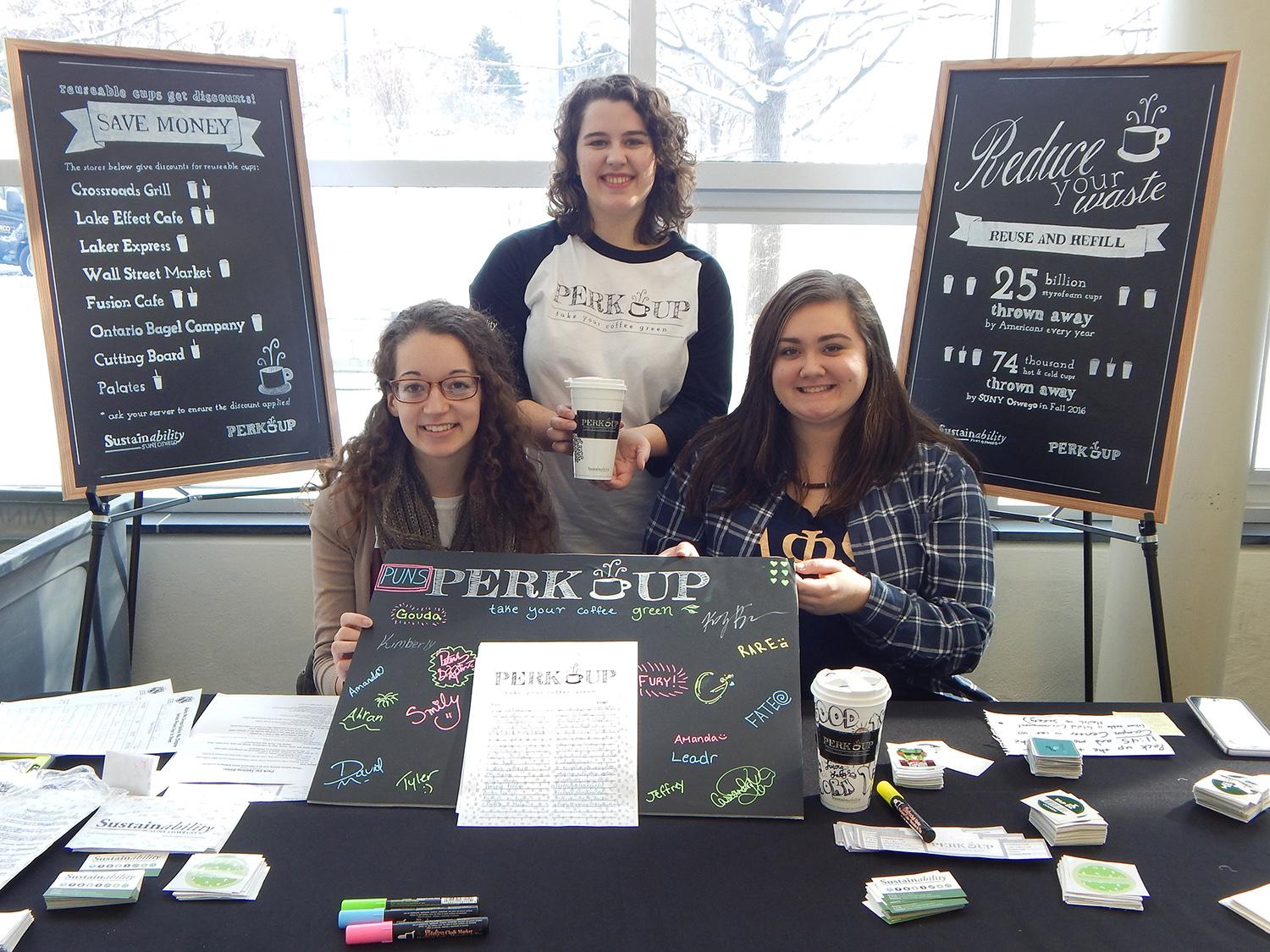Sustained efforts -- SUNY Oswego's Office of Sustainability conducts awareness-raising campaigns -- here with a 2017 information table on the "Perk Up" campaign on behalf of reusable coffee cups -- and substantial but less visible efforts to reduce the college's carbon footprint, such as working with other higher education institutions to develop the Large Scale Renewable Energy project for expanding and procuring cleaner power.
Two significant developments in the SUNY Oswego Office of Sustainability show promise to produce substantial reduction in the college's carbon footprint.
Nicholas J. Lyons, SUNY Oswego's vice president for administration and finance, recently signed a letter of intent to support the New York Higher Education Large Scale Renewable Energy Project (LSRE).
Under the project, a consortium of 21 colleges would use the power of SUNY to build, maintain and farm permanent solar, wind and hydropower sources, offsetting as much as 30 percent of the institutions' energy needs.
This procurement promises a "massive step forward" in the carbon-neutrality commitment for Oswego, SUNY and New York state, according to Michael Lotito, sustainability engineering coordinator for the college.
Additionally, the Office of Sustainability recently announced it has received a NYSERDA grant of $154,000 to update and move forward the college's roadmap for near- and long-term energy conservation and reduction of fossil fuel usage.
College President Deborah F. Stanley was a charter signatory in 2007 of the American College and University Presidents' Climate Commitment, pledging to neutralize the institutions' contributions to greenhouse gas emissions over time.
"Using our Climate Action Plan and Environmental Sustainability Roadmap as our guides, SUNY Oswego has made consistent, often inspired progress toward a cleaner, greener environment," Stanley said. "Our staff, faculty and students continue to seize opportunities to make strides great and small -- and to build partnerships both local and global -- to advance toward carbon neutrality."
Raising awareness
The latest strides occurred as the Office of Sustainability and other campus organizations prepare for Earth Day, April 22, and "Earth Week" projects and events.
The NYSERDA (New York State Energy Research and Development Authority) grant application gave the college the impetus to review five years' worth of achievements in sustainability projects and awareness-raising activities across the campus.
Jamie Adams, sustainability programming coordinator, said the office has benefited from 25 student interns; those who have graduated are all employed, some in related fields.
The students have taken on projects such as Tap In, which has offset about a million plastic bottles of water with sustainable options such as refillables; a similar program for coffee drinkers called Perk Up has saved 3,000 cardboard cups; Local Food Awareness and Procurements, a farm-to-table collaboration with Auxiliary Services; Save the Trees, which in its first week and a half saved 13,500 pages of paper; Recyclemania, a national competition won by SUNY Oswego volunteers two years in a row; the Leave Green program, enabling students to donate clothing and items from their residences rather than trashing them; and the national-award-winning BikeShare and BusShare programs.
"BusShare has taken off in a big way," Adams said about the web-based tool that enables riders to find the most convenient and efficient Centro bus route. "We're studying implementation of a Ride Share program that would benefit many on campus, including faculty and staff commuting from Syracuse."
Substantial gains
While these awareness-raising activities have generated carbon-footprint savings at Oswego, the new Large Scale Renewable Energy project promises substantial gains for all of its partner institutions in higher education. The project "provides all New York campuses, SUNY or private, big or small, an opportunity to become a leader in sustainability by supporting new, large scale renewable energy generation projects in New York state," according to documents supporting the letter of intent.
Lotito will serve as Oswego's representative for the LSRE project. He noted that both the NYSERDA funding and the commitment to participate in the LSRE align with new SUNY Chancellor Kristina M. Johnson's own emphasis on renewable energy.
"Oswego's Office of Sustainability is a member of the SUNY Sustainability Coalition, a broad spectrum of SUNY professionals dealing with issues critical to sustainable initiatives," Lotito offered.
Under the NYSERDA grant, which is contingent on $121,300 in additional, campus-provided funds, O'Brien & Gere will work with SUNY Oswego to develop a greenhouse gas inventory, update the college's STARS report and Environmental Sustainability Roadmap.
Among the many steps in the project, the college, with O'Brien & Gere's assistance, plans to complete a Preliminary Energy-Use Analysis (PEA) and accomplish energy benchmarking of 35 buildings that are submetered for electricity.
SUNY Oswego also would update its Climate Action Plan and its STARS -- Sustainability Tracking, Assessment and Rating System -- report. As a member of the Association for the Advancement of Sustainability in Higher Education, the college uses a standardized self-reporting system that provides a comprehensive framework and common set of measurements, so that colleges and universities can benchmark their own and their peers' sustainability performance.




